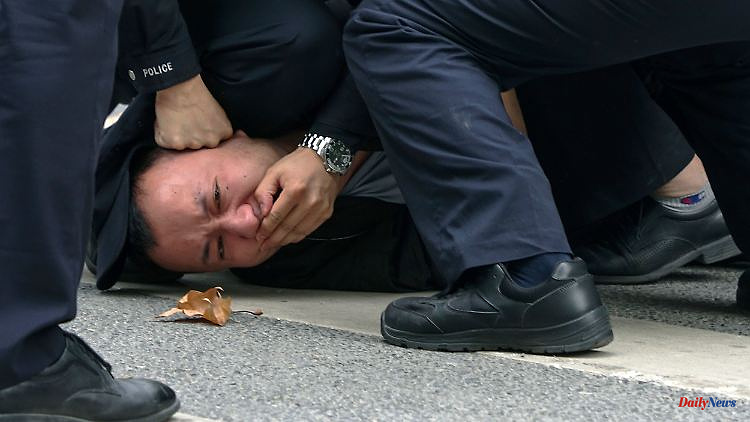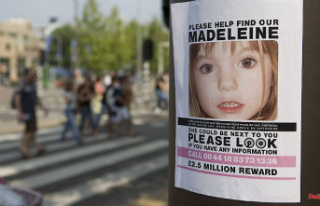Everywhere in China, people gather on streets, squares, and universities at the weekend and demand an end to the strict corona measures, but also democracy and freedom of expression. Such an open protest is rare in the People's Republic. What's behind it? And how does it continue?
Lockdowns, mass tests, forced quarantine: China continues to react to every single Covid case with draconian coercive measures. But the patience of many Chinese seems to have been exhausted after three years of the pandemic. Dozens of protests erupted across the country over the weekend in an extraordinary wave of civil disobedience.
For the second night in a row, thousands of demonstrators gathered in Shanghai on Sunday and chanted slogans against the strict zero-Covid policy, the Communist Party and against ruler Xi Jinping himself, which rarely happens on the open street in China. There were also protests at a number of universities. At Tsinghua University in Beijing, students demanded democracy, the rule of law and freedom of expression. The most important questions and answers about the extraordinary protest movement:
How did the protests come about?
Frustration with the strict zero-Covid policy has been spreading in China for a long time. As the rest of the world returns to reasonably normal life, the Chinese population is still facing sudden, harsh lockdowns. It is not uncommon for entire districts to be cordoned off, often only because of a few corona cases. The population has long since lost confidence in the authorities. Again and again those affected report poor quarantine conditions, food shortages and delayed emergency care.
The trigger for the rare public displeasure, however, was an apartment fire in the metropolis of Ürümqi in the north-western Chinese region of Xinjiang on Thursday evening, which killed at least ten people. Many people criticized that the extinguishing and rescue work had been hampered by the strict corona measures. Her anger was compounded by a response from an officer who appeared to blame residents for not rescuing themselves.
However, the fire joins a long list of incidents that have caused the mood in the country against the Corona policy to continue to boil. In September, a bus that was supposed to take people to a quarantine center in Guizhou province crashed. 27 people died. The death toll from the bus accident far exceeded the two Covid-related deaths the province had reported since the pandemic began. Reports of suicides as a result of the inhumane quarantine conditions also spread rapidly. Most recently, workers at the sealed iPhone factory in Zhengzhou, central China, engaged in street battles with the police.
People have now "reached a boiling point because there is no clear direction to end the zero-Covid policy," Alfred Wu Muluan, a Chinese policy expert from the University of Singapore, told AFP. The party "underestimated the anger of the people".
What do the white A4 sheets mean?
The central symbol of the burgeoning protest movement is a white sheet of paper. On the campus of Beijing's elite Tsinghua University on Sunday afternoon, for example, a student was the first to stand on the steps of a university building in protest: silently, with a white DIN A4 sheet of paper. It was reportedly taken away from her by staff, but the young woman did not move. She was soon joined by dozens and later hundreds of people.
The white sheets are an allusion to the lack of freedom of expression and rampant censorship in China. "The white paper represents everything we want to say but can't say," a young protester in Beijing told Reuters news agency. In a video recorded in Liangmaqiao, Beijing, a woman criticized state media's coverage of the "man-made" tragedy in Urumqi. "It's all lies, it's all silence," she said. "We started the memorial movement for the blank paper. Are we saying anything on the paper? No. All the accusations are in our hearts. All the thoughts are in our hearts."
How is the Chinese government reacting?
During the protests in Shanghai, the police sometimes cracked down on demonstrators. Numerous people were arrested. Among them was a reporter from the British broadcaster BBC, who had reported on the protests in Shanghai. According to the BBC, he was beaten and kicked by police officers when he was arrested, even though he was accredited as a journalist. He was released after several hours. In the other cities, too, the Chinese government sent a large contingent of police to smash the demonstrations.
Beijing is also trying to suppress reports about the protests critical of the regime. These were difficult to find on Twitter on Sunday. The reason was an hour-long flood of spam messages advertising Chinese escort services, the Washington Post reported. As a result, tweets that provided information about current events were lost on the platform.
Why are these protests so important?
These are the largest protests in China since the 1989 democracy movement, which was bloodily crushed by the military on June 4 of that year. "That the protests are so synchronized in terms of scale and size is really a remarkable development," Dali Yang, a political scientist at the University of Chicago, told the British "Guardian". According to Yang, everyone can identify with the victims of the Ürümqi fire or the bus accident, for example, because after all it could happen to anyone. "All of these people are in the same situation: constant lockdowns, worried about jobs and frustrated with medical care."
Meanwhile, hundreds of thousands of people have gathered in Qatar's stadiums to watch the World Cup. The tightly packed, maskless crowds have not gone unnoticed by Chinese fans, although TV stations have deliberately avoided footage of full ranks. Traditionally, Chinese TV stations censor international sports games by avoiding footage of crowds in case someone is holding a politically sensitive flag or the like.
The government is also trying to control the Internet. International social media platforms like Twitter and Instagram are blocked by China's censorship, the "great electronic wall". However, technically experienced Chinese can bypass the firewall with special software via so-called Virtual Private Networks (VPN) and thus post information about the protests. Some demonstrations were broadcast live across national borders. Chinese students abroad also organized protests around the world.
The demonstrators keep finding creative ways to distribute videos and posts about the protests, to express their solidarity or to complain about the authorities. In Beijing, demonstrators called for the return of free speech. "Give us back the films, we want film freedom. We want freedom of expression. Give us back the media, give us back journalism."
What happens next?
Protests are not uncommon in China, but the scale of the current demonstrations is extraordinary. And the government does not want to and cannot meet the demand for the end of the strict zero-Covid policy any time soon. It remains to be seen whether the protests will continue or even increase over the course of the week and how the authorities will respond. Those identified as protesters are likely to face severe consequences, experts say.
The state media has so far not commented on the protests, but instead published urgent calls for "unwavering adherence" to the zero-Covid strategy. According to political scientist Yang, local authorities are reacting differently to the protests: some areas have seen random relaxation of restrictions, while other areas have seen police crack down. To appease people, Yang said the government could "provide much clearer guidance, such as how and when China could exit the zero-Covid program." So far, the messages have been frustrating and confusing. "The challenge is that the virus doesn't just go away."












